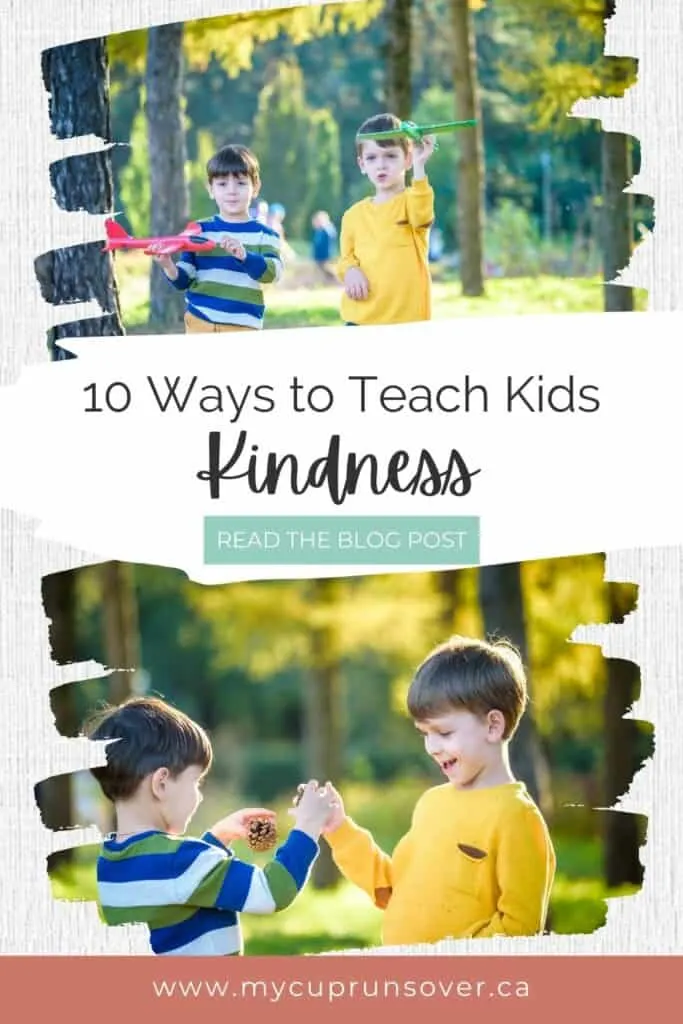As parents, we want to raise our children to be kind and compassionate, but teaching these social skills can be difficult. It’s hard enough to get them to stop hitting each other–how are we supposed to get them to make the leap to putting others ahead of themselves? In this post, guest author Andrea Gibbs from Montessori Academy shares ten ways you can teach kindness to kids.

What is Kindness?
Kindness refers to benevolence that seeks the welfare of others. It is often confused with niceness, which politely hides true feelings and presents a socially acceptable face. Kindness is based on goodwill and altruism, while niceness is based on avoiding conflict and pleasing others to make them like you.
Thus, being kind means doing something kind for someone else without expecting anything in return. Kind deeds can be as simple as smiling at someone or holding a door open for them.
You can help kids practice small acts of kindness every day to help them develop a core value system grounded in compassion and care for others.
It may be difficult for young children to consistently show kindness because they are still developing their social and emotional skills and may not yet have an empathic concern for others. There is no rush, however. Children must develop the capacity for empathy and altruism before they will naturally start acting kindly toward others, and you can help them do this by teaching them about kindness and engaging in activities that specifically promote it.
Why do We Need to Help Children Cultivate Kindness?
As a mother of a four-and-a-half-year-old, I want my daughter to be kind. I want her to be courteous, respectful, and considerate of others. Of course, all children do this in some form or another, but I want her to show kindness in a more deliberate way. This is especially true at home, and with the people we care about, who often see our worst sides. I want her to learn to be kind to everyone, not just a select group that will make her look good or appear smarter or more mature.
Teaching her about kindness is a great way to reinforce positive behaviors at home and with her friends. It gives her ideas about how she can demonstrate kindness and makes it easier for me to point out where she could have done better.
Teaching her about kindness also helps her understand that she’s not the center of the universe. It teaches her that other people have needs that are just as important as hers and that she can play a role in filling those needs.
By practicing kindness, children learn that life is more pleasant when they focus on the well-being of others instead of focusing solely on their own needs.
10 Ways to Help Children Cultivate Kindness
1. Help Kids Understand What Kindness Means
Make an effort to teach your little ones how to show kindness by giving them examples and telling them stories about other kind people. The way you talk about kindness will show your children what actions are considered kind and will demonstrate that these are qualities to be valued.
View the books you read, the movies you watch, and the stories you tell as teaching opportunities. For example, right after you’ve watched a movie is the perfect time to have a short discussion about the characters and any sacrifices or kind choices they made. Instead of trying to explain to your child why the character’s choices were good, ask questions to elicit their thoughts on it. Kids usually pick up on more than you expect them to.
You can also look for such examples in everyday life. When a family member or a best friend goes out of their way to do something nice for your child, make sure to comment afterward on their act of kindness. For example, you might say something like, “Wasn’t it kind of Auntie Susan to bake cookies for us? Who do you think we could do something kind for today?”
2. Model Positive Action
Bridge the gap between your expectations for your child and their behavior by modeling positive actions. Give your kids feedback about what they do well and talk to them about the kind actions you notice. If you see them make a choice that is unkind, give them ideas of kind acts they could do instead and if possible, demonstrate one of those acts of kindness in action.
Be sure to give them specific kindness ideas. It might not be enough to tell younger children to treat others as you would want to be treated. Instead, suggest little things they can do to be more kind. For example, “How about we help Sam pick up his blocks?” or “Let’s write a kind note to Grandma to thank her for the birthday gift.”
3. Treat Your Kid with Respect
Treat your kids with respect by treating them kindly yourself. It will help them understand the power of kindness.
Give your kids opportunities to practice being kind, but don’t expect perfection. Listen to them when they speak and react in a positive way. When they do unkind things, give them an opportunity to try again by making a more thoughtful choice.
Don’t expect these important skills to develop overnight. We’re trying to develop a lifelong habit, and that takes time.
4. Encourage Kids to Make Friends
In order to develop kindness, children need opportunities to socialize with other kids and adults regularly. It’s easy to think kind thoughts when we are not face-to-face with people, but the more we interact with others, the more likely we are to experience conflict. And conflict provides the perfect opportunity for kind kids to hone their skills.
Encourage your child to join activities that involve interaction with other children. Sign them up for a soccer team or a musical theatre class. Make it clear that they will be expected to treat their classmates with respect and kindness. The more they interact with adults and kids of all ages, the more they will get to see and practice kindness in action.
5. Don’t Let Unpleasant Behaviors Pass
Sometimes children intentionally hurt others. For example, young kids playing with Lego set together may fight over one of the pieces. Many times, their frustration will cause them to react with hurtful words or even a physical blow. Rather than passing off these actions as nothing to worry about, address them right away and show your child how they can be more kind.
When my daughter acts unkindly towards a friend, I stop the behavior and tell her that those actions are not kind. I ask her if she can think of a better way to behave. If she struggles, I help her figure out the best way to respond.
For example, she might have been rude to her friend because she was tired, hungry, or had headaches. I would address the rudeness by saying, “It’s okay to say you are tired. But being rude isn’t okay. Let’s apologize to your friend and then we can all take a little snack break.”
6. Acknowledge Your Kids’ Kindness
When you notice your child makes a good choice or shows kindness, acknowledge them by telling them how proud you are or how well they did.
This simple act of acknowledging their behavior gives your children the message that it is best to be kind. It also helps them learn how to distinguish between good behavior and bad behavior.
When my daughter gives her best effort for an assignment at school, I make sure to tell her, “You did a great job!”
7. Teach that Words Hurt
When your kids are around other kids doing something they don’t like, help them understand that excluding or calling someone names can be as hurtful as hitting or hurting them.
Children need to understand that even if they feel upset with another child, it is not okay to exclude them from play or call the other child mean names. Instead, help them think through ways to respond in a kind manner.
For instance, If you hear your kid calling another kid a “poo-poo head” in the sandbox, settle into a problem-solving mode with both kids. Point out the hurt that’s been caused: “Can you see the sadness on her face?”
Get to the root of the problem. For example, maybe the name-caller needs the sand bucket and nobody was sharing it with her. Here, we can try asking a question like, “If you need something, what’s another way you can get it without hurting your friend’s feelings?”
Correcting your child’s unpleasant behavior will enhance their emotional intelligence, which is the ability to understand the emotions of others. Kids can handle challenging situations with ease. In addition, they can control their emotions when dealing with others in social settings.
8. Avoid Competition Within Your Family
If you’re worried about how your children will get along, put an end to competition amongst family members. When we encourage our children to compete with each other, we take away an opportunity for them to build each other up and help each other. Instead, choose activities that encourage collaboration and teamwork.
Find ways for your kids to work together and help each other without encouraging comparisons. Make sure everyone gets a turn, and don’t judge if someone is “better” than the other person at something. Tell your kids that it’s more important to be kind than to win.
9. Show Them How to Help People in Need
Tell your kid you want to help people. Show them that helping those in need makes the world a better place. Visit a local animal shelter and volunteer to help with the animals. Put together care packages for people staying at a nearby homeless shelter. Donate gently used books to the local library. Help out at a soup kitchen. Give grocery store gift cards to the food bank.
Encourage kids to help others whenever they can. Demonstrate with your actions how it feels good when someone does something nice for you and help them develop a love for blessing people in this way.
10. Be Patient
Kindness can take time to master, especially if you are teaching them something that’s not natural. It is important to be patient with your kids as they are learning how to be kind. Keep trying new ways to teach your kids kindness, and don’t give up!
It may take a while before your child can master kindness and empathy. You should continue to reinforce these behaviors even after you think your kids have gotten the hang of it.
Remember, just telling your kids to be kind isn’t enough. It takes time, energy, and lots of love to raise kind children.
If you’re concerned about how your child is behaving or how they treat other children, don’t hesitate to talk with a professional like a physician or therapist that specializes in helping parents support their children’s healthy development.

Andrea Gibbs has lived in New York her whole life. She’s a work-at-home mom with a background in business development, strategy, and social media marketing. She’s a blog contributor at Montessori Academy, where she motivates and educates other parents about how they can get their children ahead of the game in school.

